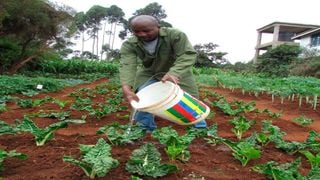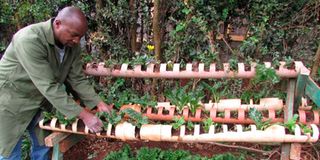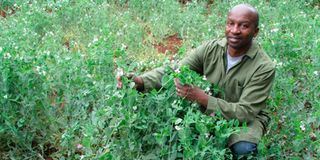
Edward Kagwamba on his farm in Thogoto Greens Estate, Kikuyu, Kiambu County.
| Sammy Waweru | Nation Media GroupSeeds of Gold
Premium
How I turned my tiny garden into cash cow
What you need to know:
- Edward Kagwamba has sub-divided his land into sections to accommodate the various crops.
- Spinach, lettuce, corriander and collard greens are among crops he grows on his eighth-acre.
Dressed in a green overcoat, blue trouser and matching T-shirt, Edward Kagwamba walks in his garden in Thogoto Greens Estate, Kiambu County, carrying some ash in a tray which he applies to his vegetables.
“I farm them organically, the ash helps to keep pests and disease at bay,” says Kagwamba.
His journey into farming started sometime in February 2020, when he visited one of the malls in Karen, Nairobi, to shop for his family.
“I had gone to purchase vegetables for breakfast but I did not find any in the supermarket,” says the father of three.
“One of the attendants told me the outlet had gone for four days without vegetable supplies.”
He saw a business opportunity. He shared the idea with his wife and siblings and they encouraged him to push on. But as he was planning to start, the Covid-19 pandemic struck the country setting him back.
And as fate would have it, Kagwamba, 48, who had worked in the tours and travel industry for 25 years, lost his job. But this did not dampen him, Kagwamba later set up his Green Gardens Ltd, starting with Sh20,000 capital.

Edward Kagwamba on his farm in Thogoto Greens Estate, Kikuyu, Kiambu County.
“I farm an array of vegetables on eighth-acre, from sukuma wiki to spinach, cabbages and black nightshade (managu). I also grow beetroots, capsicums, cucumber, onions, garden peas (minji), maize and tomatoes.”
Kagwamba has sub-divided his land into sections to accommodate the various crops. Lettuce, beetroot, carrots, dania (corriander), capsicums, tomatoes, onions and cucumber occupy 8 by 10 feet sections each.
Sukuma wiki and spinach sit approximately on 20 by 30 feet sections for each. On the other hand, maize and green peas occupy the rest.
He farms his crops organically as one of his strategies to get good market.
“I grow the crops using cow, chicken and goat manure, supplied by neighbours at no charge. I further don't use any pesticides or herbicides to control pests and diseases,” Kagwamba, who employs one person, says.
His first customers were his neighbours, who visited the farm to buy the vegetables as soon as they matured.
He recently introduced pipe gardening, where he farms more lettuce, carrots and dania. Below the pipe gardens he farms other crops maximising on space.

Edward Kagwamba on his farm in Thogoto Greens Estate, Kikuyu, Kiambu County.
He sells a bunch of sukuma wiki and spinach for Sh10 while lettuce and dania retail at Sh20 and Sh5 respectfully, mainly to his neighbours.
“I am unable to meet the high demand but I am working on expanding the project on two more acres I have in Gikambura, Kikuyu,” says Kagwamba, who has set his eyes on larger market, particularly the supermarkets where it all started.
Water shortage is one of his challenges as well as birds which feed on some of his produce. The farmer relies on rain and piped water.
Geoffrey Kavita, an agronomist with Amiran Kenya, says a farmer should practise crop rotation to help control soil-borne diseases.
“With good crop rotation programme, a disease such as bacterial wilt which is a big threat to various crops will be controlled,” the expert says.
He adds mixed farming helps in manage soil fertility and compacting soils.
“Continuous growth of a crop belonging to the same family might lead to nutrient depletion,” Mr Kavita warns, urging farmers practising mixed farming to incorporate leguminous crops such as beans and green peas as they are good in nitrogen-fixing.





